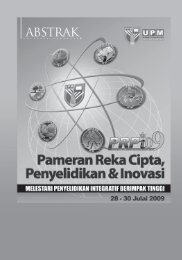BUKU ABSTRAK - Universiti Putra Malaysia
BUKU ABSTRAK - Universiti Putra Malaysia
BUKU ABSTRAK - Universiti Putra Malaysia
Create successful ePaper yourself
Turn your PDF publications into a flip-book with our unique Google optimized e-Paper software.
Work-family Conflict among Single Mother Employees<br />
Prof. Dr. Aminah Ahmad<br />
Maznah Baba and Siti Aishah Hassan<br />
Faculty of Educational Studies, University <strong>Putra</strong> <strong>Malaysia</strong>,<br />
43400 UPM Serdang, Selangor, <strong>Malaysia</strong>.<br />
+603-8946 8225; aminah@ace.upm.edu.my<br />
Keywords: Work-family conflict, dispositional factors, job factors, organisational factors, single mother employees<br />
Emotional Exhaustion and Parental Functioning of Junior Medical Doctors<br />
Prof. Dr. Aminah Ahmad<br />
Maznah Baba<br />
Faculty of Educational Studies, University <strong>Putra</strong> <strong>Malaysia</strong>,<br />
43400 UPM Serdang, Selangor, <strong>Malaysia</strong>.<br />
+603-8946 8225; aminah@ace.upm.edu.my<br />
Keywords: Role overload, work-family conflict, emotional exhaustion, junior doctors<br />
175<br />
Social Sciences<br />
Researchers have identified work-family conflict as one of the major stressors in the workplace leading to<br />
various negative outcomes, including impaired well-being. Although many studies have been conducted on the<br />
experience of work-family conflict on dual-earner couples, only a few were conducted on single parent employees.<br />
The aim of this study was to determine the level of work-family conflict experienced by single mother employees<br />
and its antecedents including dispositional (locus of control, perfectionism and gender role orientation), job (role<br />
overload and role conflict) and organisational (supervisor support and job flexibility) factors. Data were gathered<br />
from 159 <strong>Malaysia</strong>n single mother employees using self-administered questionnaires, and through the drop and<br />
collect method. Single mother employees meeting the following criteria were identified: (a) aged 45 and below;<br />
(b) working full-time, and (c) has at least one child. Seven scales were used to measure the variables, namely<br />
work-family conflict (8 items), locus of control (9 items), perfectionism (23 items), role conflict (7 items), role<br />
overload (10 items), supervisor support (8 items), and job flexibility (7 items) scales. Descriptive statistics, as<br />
well as correlation and regression coefficients were calculated. The findings of the study indicated that 66%<br />
of the single mother employees experienced moderate to high levels of work-family conflict. The factors that<br />
characterise employee disposition, job factors as well as organisational factors contributed 51% to work-family<br />
conflict, with job factors contributing the most. The experience of work-family conflict among single mother<br />
employees can be explained by dispositional and job factors. The findings imply the need for measures to be<br />
taken by employees, human resource managers and organisations to help reduce the level of work-family conflict.<br />
Future research needs to focus on the adoption of family-friendly employment policies that could further help<br />
reduce such conflict.<br />
The use of a mediation model for understanding the mediating impact of work-family conflict on the<br />
relationship between role overload and emotional exhaustion as well as parental functioning has not been given<br />
much attention. This study tested a mediation model consisting of emotional exhaustion and parental functioning<br />
as dependent variables and role overload as the independent variable, with work-family conflict as its mediator.<br />
Data were gathered from a sample of 220 female junior doctors aged 40 years and below, having at least one child<br />
as well as working full-time in 14 public hospitals in <strong>Malaysia</strong>, using self-administered questionnaires. The data<br />
were analyzed using correlation and multiple regression analyses. Results of correlation analyses revealed that<br />
role overload was significantly related to work-family conflict, emotional exhaustion and parental functioning,<br />
and work-family conflict was significantly related to emotional exhaustion and parental functioning. Results of<br />
a series of multiple regression analyses indicated that work-family conflict partially mediated the relationship<br />
between role overload and emotional exhaustion, as well as the relationship between role overload and parental<br />
functioning. Junior doctors who experience role overload seem to be more emotionally drained and the role<br />
overload had an impact on the quality of parental functioning, and they seem to experience greater conflict<br />
between work and family roles. There is a need to reduce the role overload that doctors experience by reviewing<br />
the ratio between doctors and patients and re-assessing the number of work hours and the weekly frequency of<br />
on-calls. Limiting on-call frequency and hours may be more likely to reduce work-family conflict as well as<br />
emotional exhaustion.



